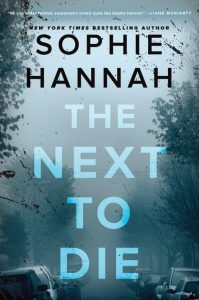 Sophie Hannah’s books are police procedurals, and technically a series, but she seems always more interested in plot than in the coppers making the deductions. That’s not a bad thing, but there’s no Inspector Dalgleish or Rebus or Banks to love. Instead, the reader gets the messier – and no doubt far more realistic – interchange of police at all different levels and abilities. In the case in this novel, the group have a very puzzling crime to solve.
Sophie Hannah’s books are police procedurals, and technically a series, but she seems always more interested in plot than in the coppers making the deductions. That’s not a bad thing, but there’s no Inspector Dalgleish or Rebus or Banks to love. Instead, the reader gets the messier – and no doubt far more realistic – interchange of police at all different levels and abilities. In the case in this novel, the group have a very puzzling crime to solve.
Hannah diffuses her narrative with different narrators, newspaper columns, emails, and a host of other devices that keep the reader guessing along with the detectives. There’s the straight up procedural story where the police are trying to solve a string of four murders that look to be paired murders of best friends, though carried out at different times and in different locations, and then there’s the story of the various characters in the novel.
There’s the story of comedian Kim Tribbeck, who shares narrative duties via excerpts from her memoir, as she recounts her connection to the killer, Billy Dead Mates. There’s an angry feminist columnist who is sure that all crime is basically men killing women (she ignores the lone male victim) and who is being sent helpful stories and reading suggestions by the killer. Then there’s the police officers who are using everything at their disposal to figure out what’s going on. And for the reader, all the emails, stories and columns are clues, so pay attention!
While Hannah uses many of the tricks and tropes of the modern detective novel – thoughtful and lengthy looks at each character’s development and motives, good or bad, with a close eyed view on the minutia of life, she’s also quite the skillful traditional detective novelist. Her story schema is smart and satisfying and to me, made the book a worthwhile read.
I think in all great crime fiction it’s the slight of hand that makes a story stick with you. A shift in focus, and voila, you realize you’ve been looking at everything from the wrong point of view, missing what’s been in plain sight. Agatha Christie, of course, was a master at this kind of thing.
While I was restless through the long middle of the book (something I never encounter in a Christie novel) when Hannah started to pull her narrative threads tighter and created a denouement well worthy of Poirot himself I knew this was a book that was going to stick with me, especially the unusual motive for the crimes. I would advise any reader that patience is a virtue when reading this novel.
readers of Tana French will enjoy this novel.